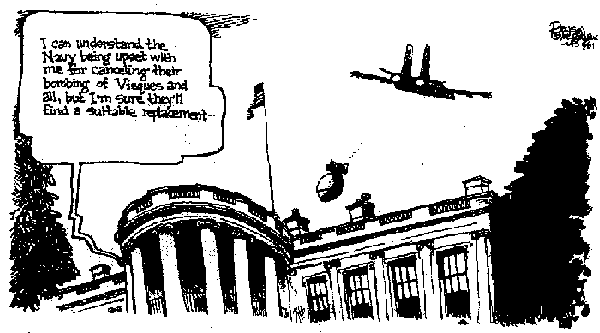Michael Fumento
Factual · Powerful · Original · Iconoclastic
Surprise Attack on the Navy
January 01, 2001 · Michael Fumento · Washington Times · MilitaryPresident Bush may have just handed the Navy one of its worst setbacks since Pearl Harbor.
It will leave as its only memorial the willingness of politicians to give into loud-mouthed activists and to cave in to every bizarre health scare that drops from the sky. And it won’t even make for a good movie.
In an announcement that caught everyone completely off-guard, Mr. Bush has declared that training exercises on the Puerto Rican island of Vieques, including offshore gunfire, bombing, and Marine maneuvers, will end within two years.
Since then, U.S. Navy Secretary Gordon England says he advised the president to abandon the range, thereby completely refuting everything his own department has said about the terrific importance of keeping the range.

"I’ve cited the U.S.S. National Defense! Going in for the kill!"
Still, there’s no getting around the meaning of the words "commander in chief." Further, the president offered no valid explanation for giving up this vital part of our national defense, offering merely that "My attitude is that the Navy ought to find somewhere else to conduct its exercises for a lot of reasons."
Those reasons? "One, there’s been some harm done to people in the past. Secondly, these are our friends and neighbors and they don’t want us there." Wrong and wrong.
Heritage Foundation defense expert Jack Spencer notes that protests on the island of 9,400 consistently comprise 200 people, or fewer. "Of these, less than 10 percent at best are Vieques natives," he said. "If the locals were so concerned, you’d think they’d find a few hours of time to protest for themselves." A referendum to find out how natives really felt was just weeks away. Instead, Mr. Bush launched a pre-emptive strike.
As to the alleged harm, this stuff is just plain weird. Some accuse the Navy exercises of increasing the infant mortality rate, overall mortality rate, and cancer rate. Others allege that the sounds of blasting have prompted an epidemic of thickened heart membranes, labeled "vibroacoustic disease." A 31-year-old man even told a credulous Associated Press reporter that the bombing and shelling were making him bald. The hair "fell out little by little," said the anguished fellow.
Nobody has been able to come up with a serious theory connecting any of the supposed illnesses with the gunnery site, which is not surprising considering the spooky claims amount to nothing more than misinformation and outright fabrication.
You might be forgiven, for example, for not knowing that Vieques inhabitants closest to the gunnery site live about 9 miles away.
Yet what of the claim of environmentalist attorney Robert F. Kennedy Jr. that "Vieques has the highest rate of infant mortality and cancer in Puerto Rico"? It’s widely accepted — but totally false.
The infant-mortality myth originated in February 2000, when the Puerto Rico Physicians and Surgeons Association held a press conference to claim that the rate was more than 50 percent higher on Vieques than in mainland Puerto Rico.
They presented their conclusions to the Puerto Rico Health Department; the very next day, Puerto Rico health secretary Dr. Carmen Feliciano publicly refuted the allegations, and accused the Physicians and Surgeons Association of "lying to the public."
How so? They had neatly clipped out the years 1996 through 1998 from their statistics. With those years left in, the infant-mortality rate in Vieques is actually lower than that of mainland Puerto Rico.
What about the allegations that the overall death and cancer rates are higher in Vieques than in mainland Puerto Rico? The death rate hardly means anything, if you consider that 47 of the 50 states also have higher mortality rates than mainland Puerto Rico.
Finally, what of that strange "vibroacoustic" heart malady?

As for the high cancer rate, it comes from data compiled by Dr. Diego Zavala of the Puerto Rico Cancer Registry in 1997 - which data actually show that the annual cancer rates on Vieques have been alternately both higher and lower than those of mainland Puerto Rico over the past several decades.
In any case, the reported cancer rate on Vieques is actually much lower than that of many major U.S. cities.
Dr. Nuno Castelo Branco claimed to have found heart-membrane thickening among Portuguese aircraft-factory workers exposed to as much as 10 years of constant jet-engine noise.
Even if that particular claim stands up, it rather stretches the imagination to think that the thump of shell explosions 9 miles away would have a similar effect; yet now Dr. Branco claims that among 50 Vieques residents he tested, 49 have this syndrome.
The federal government asked the Johns Hopkins University School of Hygiene and Public Health to look at Dr. Branco’s report. They called into question whether Dr. Branco’s finding supported the very existence of "vibroacoustic disease."
Do these really constitute a good reason to weigh anchor at such a vital training area?
A special 1999 Defense Department panel reported that, for many reasons, Vieques is unique and vital to national defense.
The panel reviewed a Navy study of the feasibility of 18 alternative areas, but concluded that "there are no potential sites that can meet the current stated requirement for combined-arms live-fire training."
Was it really necessary for Mr. Bush to bomb the Navy and our national defense to prevent the scourge of male pattern baldness?
